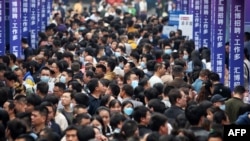China's youth unemployment hit a record high in April with 20.4% of 16- to 24-year-olds unable to find jobs, the worst rate since the country's National Statistics Bureau started publishing it in 2018.
Then came May, 20.8%, followed by June, 21.3%. In July, the government stopped publishing the figure, which is yet another indicator that the world's second-largest economy is struggling to recover from Draconian pandemic lockdowns.
Fu Linghui, a spokesperson for the National Bureau of Statistics, said at a news conference on Tuesday that the release of the "age-specific urban unemployment rate for young people" will be suspended from August.
Fu sought to dispel concerns about the youth unemployment figure, saying it may be skewed because the number of urban youths in school has been growing.
"The main task of school students is to study, and there are different views on whether students looking for jobs before graduation should be included in labor force surveys and statistics," Fu said.
Fu also said that most of this year's graduates have already found jobs.
"The employment situation is generally stable, and the employment rate of graduates is slightly higher than that of the same period last year," Fu said.
But other sources suggest the true youth unemployment rate may be much higher than reported.
Last month, Caixin, one of China's most prestigious magazines, cited a study by Zhang Dandan, an associate professor at Peking University, saying the youth unemployment rate could be as high as 46.5% if statistics included 16 million young people who chose not to look for work or who lived with their parents.
Censors removed the Caixin article soon after publication.
Tuesday's suspension of reporting on the youth unemployment rate quickly became the most discussed topic on social media platforms, with most of the comments sarcastic or suspicious, such as "the unemployment is too high to publish."
On Weibo, China's Twitter-like but censored platform, one comment was liked more than 5,000 times: "If you close your eyes, it doesn't exist."
Another netizen tweeted: "What new term is being developed? Home staying is new employment?"
"Since there's no survey, it's time for the people at the statistics office to lose their jobs, right?" asked another.
A truck driver who asked that his name not be published because he doesn't want his difficult status known by the public, says he has driven for 10 years in Nanjing, the capital city of Jiangsu province.
He told VOA Mandarin in a phone interview that although his company is understaffed, no young people are willing to work there because of the very low pay.
The driver said he's never seen any young workers at his company.
"In my company, the basic salary is only about 2,000 to 3,000 yuan ($280-$420) a month. If you count overtime pay, it's only about 4,000 yuan ($570 dollars) at the most. Overtime pay is unstable, so of course no young people want to work here," he said.
According to marketingtochina.com, the national monthly salary in China in May 2023 is 29,300 yuan ($4,214).
But at the same time, according to jobui.com, median monthly salary of Nanjing drivers is just around 4,500 to 6,000 yuan ($618-$824).
After graduating from high school four years ago, a 23-year-old worker from Yunnan province, who asked that his name not be published because he doesn't want his status known by potential employers, went to work in a factory in Guangdong province seeking a higher salary than he could earn in his hometown.
He made more than 10,000 yuan, or about $1,400 dollars a month, at a Guangdong province factory, but quit in November 2022. He thought the working conditions were brutal, especially having to work more than 10 hours a day.
He returned to his hometown, Lijiang, but after eight months, he's still living off his saving as he looks for a job.
In a phone interview with the VOA Mandarin, the former factory worker said: "I've tried sending my resume to different companies, and of course also to recruiting firms. I've tried applying for everything from office assistants to other industries, but I haven't had any interviews."
He said there are jobs for delivery people or movers.
"I could go to those industries anytime, but it's just way too hard. I'd have to work over 10 hours a day and probably earn only 6,000 yuan, (about $800 dollars) a month, which is way lower than my previous factory job."
He is giving his job hunt another six months. If, after that, he's still jobless, he said he'll leave his hometown again looking for work that's not in a factory because "I'm not willing to do a job that is much harder but pays way less."





